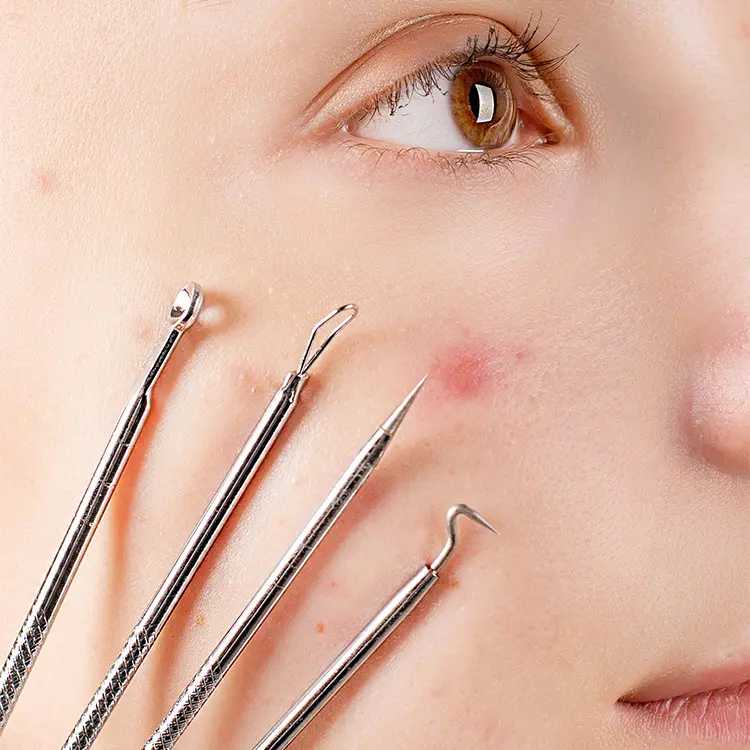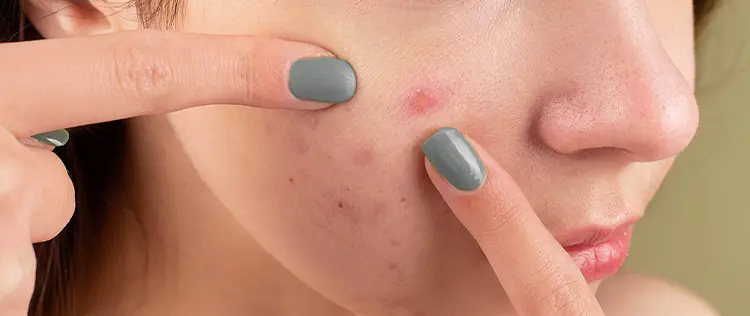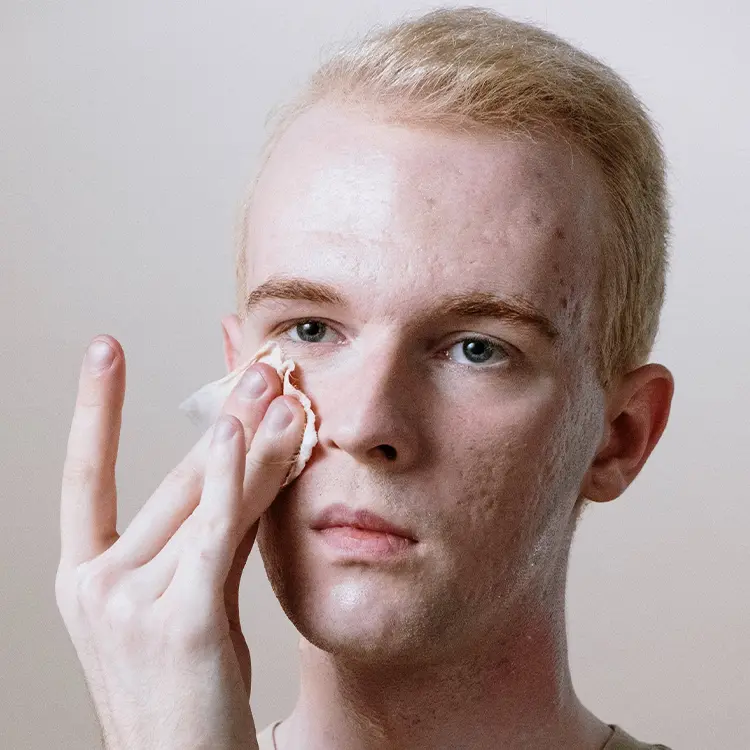Suffering from acne is painful enough. When this irritating and sometimes embarrassing skin condition leaves scarring, you could carry the reminder of that pain for the rest of your life. Acne scars are challenging to eliminate. Often, it takes a combination of treatments to get rid of acne scars or fade them. Learning all about how to get rid of acne scars and the types of treatment available is often the first step towards getting rid of acne scars.
Many factors impact the effectiveness of acne scar treatments, whether they involve home skincare or clinical procedures like chemical peels. It may even require different approaches in different areas of your body.
It can take some trial and error to figure out what works best. An excellent place to start your journey is with a cosmetic dermatology specialist. A dermatologist will do an assessment, discuss how to get rid of acne scars, and advise you on the top treatments.
What Causes Acne Scars?
If you are asking, “How to get rid of acne scars fast?” understanding how they form can help. Acne scarring develops as a complication of the skin condition acne. The National Institute of Arthritis and Musculoskeletal and Skin Diseases defines acne as an inflammatory disorder. People can experience it throughout their lives at difficult levels of severity.
For many, acne is simply the occasional pimple on their face. For others, it is a chronic condition that they fight from puberty into adulthood and beyond.
Acne does not discriminate. It can affect people of all races and ages. Although, often, the most severe breakouts occur during the teen years. This is when scarring is a serious risk.

Different Types of Acne Scars
Generally, acne scarring fits one of two categories: raised or depressed. When there is too little collagen production, you get a depression scar or one that leaves pitting in the skin. If there is too much collagen, you see a raised acne scar or bands above the skin surface.
There are also three main types of scars.
Atrophic acne Scars
Atrophic scars are small indentations that form on the skin. You might also find atrophic acne scars described in three categories:
- Ice pick scars – These are depressed scars that look like small, deep holds in the skin’s surface.
- Rolling scars – Depressed scars without precise edges. They give the skin a rolling look.
- Boxcar scars – These are depressed scars but more significant than the ice pick. They tend to be oval-shaped and look like craters.
Hypertrophic acne scars
These raised scars occur when the skin creates too many fibroblasts, which help build connective tissue.
Keloid acne scars
Keloid scars are similar to hypertrophic but thicker. They may also be red or brown in color.
The treatment with the most promise depends on the type of acne scarring.
Potential Causes of Scarring
Scarring can occur when someone picks on acne cysts, whiteheads, and blackheads, but that is not the only potential cause. In cases where the acne penetrates deeply into the skin, it can cause damage. To heal that damage, the body produces collagen, which is what supports skin structure. You will get a scar if there is too much or too little collagen.
Who is Most Likely to Get Acne Scars?
Anyone can get these scars, especially if they pick at the acne lesions. Other risk factors for scar formation include:
- Acne cysts and nodules
- Not getting acne treatment
- Family history of acne scarring

How to Get Rid of Acne Scars: Different Types
You could eliminate the scars in many ways, from home treatments to over-the-counter products to medical procedures. What will work best for you depends on different factors, such as:
- Scar type
- Skin type
- Severity of scarring
For severe scarring, you should see a dermatologist. Nothing other than medical treatments is likely to eliminate deep, extensive scarring. You can try home treatments, though, if the scarring is minor.
Atrophic Scarring
For minor atrophic scarring, you might try an over-the-counter retinoid product. Retinoids stimulate collagen production that can even out the skin texture and pigmentation. You should avoid trying a home chemical peel for this form of scarring as it may cause further damage.
A medical professional will approach more extensive atrophic scarring with things such as;
- Chemical peels
- Dermabrasion
- Dermal fillers
- Microneedling
- Laser resurfacing
Once the scars fade, there may be additional treatments recommended to even out skin discoloration, such as:
- Chemical peels
- Laser therapy
It may take a combination of treatments to get the best results.
Hypertrophic and Keloid Scarring
The treatment approach for raised areas involves softening the skin to reduce the appearance of scars. Home treatments that might help include:
- Bio-oil
- Massage
- Silicone sheeting
Dermatologist treatments for raised scars involve:
- Steroid injections
- Surgical removal
- Laser therapy
Whether you try a home treatment or see a doctor, the goal is the same – to reduce the height of the raised area.

Best Natural Ways to Get Rid of Acne Scars
The first line of defense when treating acne scars may be a natural remedy used at home. It’s not clear how well some of these remedies work, though. Here are some non-invasive natural treatments people often try:
- Onion extract – Some evidence suggests that onions can help reduce inflammation and work as an antibacterial. Onions also contain the antioxidant quercetin, which may be effective on scar tissue. The onion extract might also irritate the skin, so use it only once a day.
- Manuka honey – Honey, especially manuka honey, is known for its ability to promote wound healing, which might be beneficial. Manuka honey comes from bees pollinating a tea tree in Australia or New Zealand.
- Aloe Vera is also known for its ability to soothe skin issues and promote healing. Some mix aloe vera with manuka honey to create a topical application for scars.
You can also buy home treatments that may work on minor scarring.

Best OTC for Acne Scars That You Can Do at Home
If you want to try an over-the-counter product to reduce your scars, there are some things worth considering, such as:
- Retinol/retinoids – This vitamin A derivative may help resurface the top layers of the skin, fading scars.
- Bio-oil – Bio-oil is a product you can get from most beauty supply stores or online. It combines natural oils like minerals, sunflower seeds, and vitamin E. It may help soften raised scars.
- Skin products with vitamin C – This would include oils and serums. Vitamin C is an antioxidant and can reduce pigmentation.
- Niacinamide oil is a form of vitamin B that can smooth and soften skin.
- Azelaic acid serum – This can help treat discoloration, removing darker skin that appears around the scars.
- Sunscreens – Sunscreen can prevent discoloration caused by the sun. Scars do not tan, so they can stand out if you don’t use sunscreen when outdoors.
Unless your scars are minor, the most effective course of action is to see a dermatologist before trying any natural or home treatment.
Best Acne Scar Cosmetic Treatments
Often, it takes medical treatment to fade scar tissue and reduce potential side effects. The dermatologist will evaluate your skin condition and recommend one or more treatment options that can fade acne scars.
Dermal Fillers
Sometimes called a facial or a soft-tissue filler, this treatment involves injecting hyaluronic acids under the skin’s surface to add volume. Plumping up the skin around the scarred areas can help make them less noticeable.
Dermal fillers are temporary treatments. So, you would need to get them repeated to maintain the effects.
Chemical Peels
Chemical peels are mildly invasive treatments that help to rejuvenate the skin. The cosmetic dermatologist applies a chemical solution to the scar tissue. This removes the top layer of skin to reduce the appearance of the scar.
Multiple treatments over time might eliminate deeper scars. You can get more than one mild or medium chemical peel but only one deep one.
There are over-the-counter chemical peels. However, these are not recommended for acne scars because of the risk of side effects such as skin discoloration.
Microneedling
Microneedling causes a tiny bit of damage to the skin, triggering the healing process. The doctor rolls a needle-studded tool over the skin. That stimulates collagen formation and lets the skin heal itself naturally.
Laser Resurfacing
Laser resurfacing applies state-of-the-art technology to reduce acne scars. The laser removes the outer layer of tissue, stimulating new skin to grow. It also promotes collagen growth to help firm up skin in that area.
Laser treatments offer many benefits. It will trigger the growth of younger-looking, firmer tissue, reduce scars, and improve skin tone. There are minor side effects, but the recovery time is minimal.
Botox
OnabotulinumtoxinA or botox is sometimes used for scars. It can reduce the puckering around the scars to improve the appearance. Like dermal fillers, this treatment is temporary, though. You would need to continue the treatment to maintain the effect.
Why Choose Venice Avenue Dermatology to Get Rid of Acne Scar?
At Venice Avenue Dermatology, we offer patient-centric care from board-certified dermatologists. The medical professionals here have a common goal – to provide uncompromising excellence in all types of dermatology. Our doctors have more than 43 years of experience in medical and cosmetic treatments.
We provide cosmetic dermatology treatments for acne scars, like chemical peels and laser resurfacing, in a medical environment staffed with highly trained professionals. There is a medical specialist present at all times.
FAQs on How to Get Rid of Acne Scars
Here are some common questions we get on reducing or eliminating acne scars.
It is possible to reduce your risk of having acne scars. The most proactive thing you can do is to not pick at your acne blemishes or pop pimples. When you do, you release oil, dead skin cells, and bacteria that can spread the problem to the surrounding skin. That will not only lead to more acne, but it might cause scar tissue to form. The excess debris on the skin can interfere with healing.
Also, wearing sunscreen daily can lower the chances of developing dark spots and scars from your acne. Look for something with an SPF of at least 30 and wear it all year.
Finally, treat active acne. The better you control your acne, the less there is to be scarring. You can use over-the-counter treatments or see the dermatologist for prescription medicine containing salicylic acid or another drug.
They may likely fade over time, but you will still see pitting and uneven skin texture. If time isn’t fixing your problem, make an appointment so we can discuss the best treatment options with you.
The simple answer is yes. Most scars will leave some impression even if they fade over time. They can, however, lesson in-depth and contour. That means, at some point, they may be less noticeable. That could take years, though. In the meantime, it is essential that you control acne breakouts, and that might require an appointment with a dermatologist. Developing acne over scar tissue will make it worse.
Genetics can certainly play a role in severe acne. If someone in your family had serious acne, you might be at risk, too. Genetics is not the only factor, though.
It is up to the doctor to decide what is the best medical procedure for acne scars. There are a number of variables to consider. Seeing a medical doctor who specializes in cosmetic dermatology can help you pinpoint what is best for you.
The answer might have been dermabrasion at one time, but today, many doctors choose laser resurfacing instead. They both do the same thing: remove the top layer of the skin to promote healing. They just go about it differently.
The first thing they can do is evaluate your skin to see what type it is and if you have active acne that needs treatment. Then, they can help you create a plan to reduce or eliminate them.
Microneedling can be an effective treatment option for acne scars. The procedure creates tiny needle pricks around the scars. This stimulates the body’s healing process, and that can reduce the scars.
There are some temporary side effects from microneedling. You may experience swelling in the treatment area, redness, and skin flaking. The downtime is minimal. You can go back to work or school the next day unless the doctor tells you otherwise.
You can expect some side effects from laser resurfacing. Typically, people experience redness, swelling, pain, and itching in the treatment area. There may also be minor changes in skin color. Infection can be a complication of the treatment. The staff will tell you how to care for your skin and what risk signs to watch for before you leave the medical practice.
After the treatment, the doctor will apply a thick ointment to your skin and cover the area with a dressing. Follow the discharge instructions carefully after your treatment to avoid complications.
After a chemical peel, you may experience redness, scabbing, and inflammation in the treatment area. There may be some changes in skin color, as well. There is a slight risk of infection with a chemical peel.
The staff will tell you how to care for your skin and what risk signs to watch for before you leave the medical practice. You’ll also want to protect your skin with sunscreen.
There are surgical procedures to remove stubborn acne scars, such as punch excision. This procedure requires the doctor to cut out the individual scars and then repair the wound created by the surgery. Repair usually involves a skin graft and/or stitches.
We are often asked about how to get rid of acne scars of the face, but they can appear in other places like the back. For back treatments, the doctor might recommend laser resurfacing or chemical peels for acne in this area. If the scars are deep, the best option might be surgical.
Any area that is not the face may benefit from laser resurfacing or a chemical peel. In some cases, surgery may be the best option for deep scarring.
There is a lot to think about when it comes to acne scarring. The good news is you can make an appointment at Venice Avenue Dermatology and get a professional medical evaluation to see what can be done for them.
Venice Avenue Dermatology has been servicing the people in Sarasota and Charlotte counties since 1997. Our practice is board-certified by the Nurses Credentialing Center (ANCC) and a member of the American Academy of Dermatology and The Florida Society of Dermatologic Surgery.
If you are worried about your acne scarring or have other skin problems, let us help. Call and make an appointment at Venice Avenue Dermatology today, or fill out our contact form, and someone from our office will contact you.
